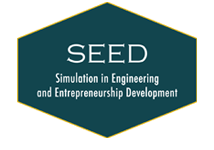
- seed@cimne.upc.edu
- +34 93 401 60 39
The Erasmus Mundus Joint Doctorate SEED provides in-depth training in the development and implementation of new state-of-the-art computational techniques for the modelling and solution of cutting-edge engineering problems in industry. Research will be carried out one or more up-to-date techniques such as:
|
|
|
SEED program aims to meet industry current needs, where early product prototyping and development is now entirely carried out through numerical modelling, prior to physical experimentation of a few selected designs. The complexities of such models require new computational approaches, which are the main focus of SEED research activities. As a result, SEED candidates aim to cover important areas in engineering which include:
SEED consortium includes 8 full partners (universities) and 5 associated partners. The programme is coordinated by UPC and managed by CIMNE.
Students will be also taught to develop core entrepreneurial skills to successfully move ideas into commercial practice through a series of transversal entrepreneurship modules, as part of their training. Doctoral students will be immersed in an innovation environment through interaction with newly established R&D spin-offs hosted within specialist incubator units.


